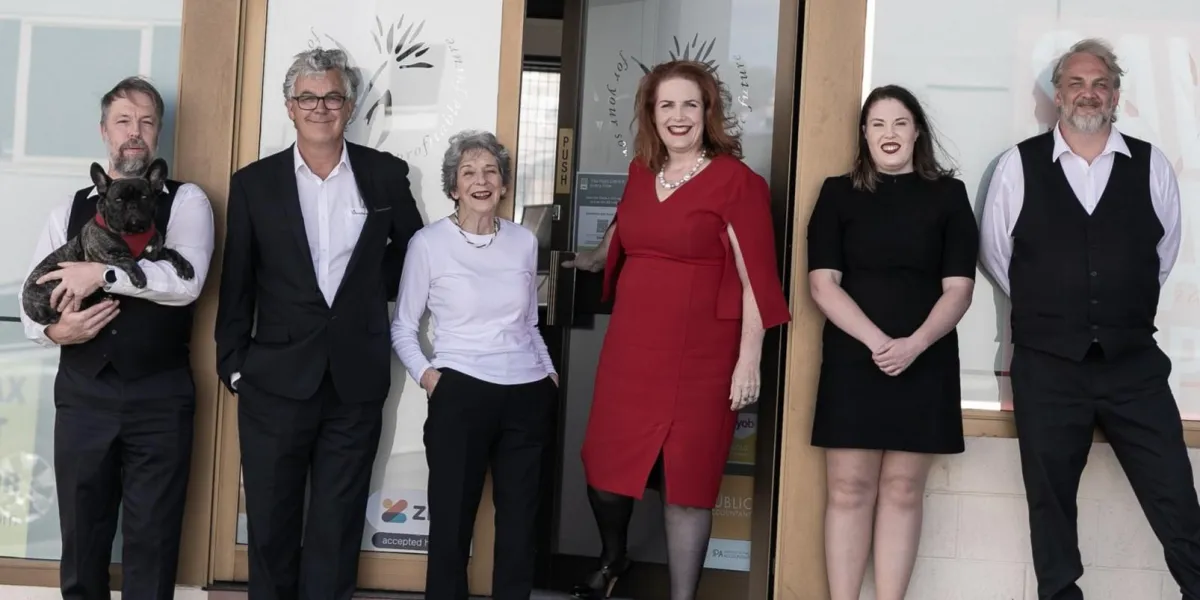Smart decisions today, Lasting value tomorrow.
Registered Tax Agents looking after a diverse and interesting range of clients, from the personal tax return to a full range of business financial services.
Making accounting beautiful
Fearless and hardworking, we are here to represent you to the Australian Taxation Office.
With attention to detail and a strong focus on the latest changes in tax law our aim is to be the best resource a small business can have.
Our staff are experienced, here for the long haul and more importantly are chosen for their communication skills.
“It’s one thing to do a great tax return & entirely another to have the client understand what is going on.”
Welcome
Founded in 1998 our firm started with just Louise Bloomfield as a sole trader. We now have 7 staff and we are growing every year.
We understand the practical mechanics behind the functioning of a business.
Being able to walk a client through the intricacies of establishing a new employee position and then hiring a staff member in a way that meets fair work and the ATO’s compliance requirements.
Whether it be compliance issues regarding a business name or changing the directors of a company, or dealing with disagreements between directors in a company. The relationship between our firm and the client is more team related – we are there with you, front and centre, helping you tackle your business dealings as and when they happen.
It’s why we push to work to a clients time frame, not ours. Life generally doesn’t play to a date on a calendar!

Our Services
Lorem ipsum dolor sit amet, consectetuer adipiscing elit. Aenean commodo ligula eget dolor. Aenean massa. Cum sociis natoque penatibus et magnis dis parturient montes, nascetur.
Accounting & Taxation
Lorem ipsum dolor sit amet, consectetuer adipiscing elit. Aenean commodo ligula eget dolor. Aenean massa. Cum sociis natoque penatibus et magnis dis parturient montes, nascetur ridiculus mus.
Business Services
Lorem ipsum dolor sit amet, consectetuer adipiscing elit. Aenean commodo ligula eget dolor. Aenean massa. Cum sociis natoque penatibus et magnis dis parturient montes, nascetur ridiculus mus.
Other Services
Lorem ipsum dolor sit amet, consectetuer adipiscing elit. Aenean commodo ligula eget dolor. Aenean massa. Cum sociis natoque penatibus et magnis dis parturient montes, nascetur ridiculus mus.
About Us

Lorem ipsum dolor sit amet, consectetuer adipiscing elit. Aenean commodo ligula eget dolor enean massa.
Nulla consequat massa quis enim. Donec pede justo, fringilla vel, aliquet nec, vulputate eget, arcu. In enim justo, rhoncus ut, imperdiet a, venenatis vitae, justo. Nullam dictum felis eu pede mollis pretium. Integer tincidunt.
Vivamus elementum semper nisi. Aenean vulputate eleifend tellus. Aenean leo ligula, porttitor eu, consequat vitae, eleifend ac, enim. Phasellus viverra nulla ut metus varius laoreet. Quisque rutrum.
Aenean imperdiet. Etiam ultricies nisi vel augue. Curabitur ullamcorper ultricies nisi. Nam eget dui. Etiam rhoncus. Maecenas tempus, tellus eget condimentum rhoncus, sem quam semper libero.
Our Mission
Lorem ipsum dolor sit amet, consectetuer adipiscing elit. Aenean commodo ligula eget dolor.
Our Philosophy
Lorem ipsum dolor sit amet, consectetuer adipiscing elit. Aenean commodo ligula eget dolor. Aenean massa.
Our Promise
Lorem ipsum dolor sit amet, consectetuer adipiscing elit. Aenean commodo ligula eget dolor. Aenean massa.
Our Guarantee
Lorem ipsum dolor sit amet, consectetuer adipiscing elit. Aenean commodo ligula eget dolor. Aenean massa.
Our Blogs

The Case for Rigorous Community Engagement
Community engagement must be the cornerstone of all local government decisions.
When we make changes to the streets where people live, conduct business, and build their lives, we must do so with a profound understanding of the far-reaching effects on all stakeholders—not merely a select few. Yet, in Hobart, this essential principle has too often been disregarded, leading to costly misjudgments and an increasing divide between the Council and the very people it serves.
Engagement has too often been cursory or failed to meet the rigorous standards required when implementing transformative and often expensive projects. The Collins Street project is a prime example of a well-intended initiative that faltered due to inadequate consultation. Small business owners in the vicinity, whose livelihoods were directly affected, were left out of meaningful discussions and decision-making processes.
This shortcoming is not an anomaly. Time and again, engagement efforts have appeared to be mere procedural formalities rather than sincere attempts to include those most impacted. The result? Frustrated communities, wasted resources, and, in some instances, the necessity of revisiting decisions that could have been executed more effectively had proper engagement been conducted from the outset.
The proposed dual bike lanes along Collins Street, for instance, have been a source of considerable distress for small business owners, many of whom were compelled to organize a public meeting to have their concerns acknowledged. Similarly, the relocation of UTAS has triggered a crisis in public confidence regarding the decision-making processes of the Hobart City Council.
Adding to these apprehensions, a peer review of the Scramble Intersections report, commissioned by the Hobart City Council, rightfully identified several deficiencies. Yet, despite these findings, substantive improvements in the quality of later reports presented to Council remain elusive. This raises pressing concerns about the diligence of decision-making procedures and the broader commitment to transparency and evidence-based governance.
Surveys designed to solicit public input have frequently been compromised by leading questions that restrict participants from expressing their genuine views. Rather than fostering open and inclusive discourse, these surveys force respondents to select from a narrow and often unsatisfactory set of options. Such flawed methodologies undermine the integrity of the consultation process, diminishing the credibility of findings and further eroding public trust in Council decisions.
A Call for Reform
The path forward requires an unwavering commitment to robust, inclusive, and transparent engagement practices—not as an afterthought, but as an intrinsic function of municipal governance.
What Must Change?
First, engagement must encompass all affected stakeholders, not just a limited subset. Property owners, renters, business operators, and community organizations all have a vested interest in significant planning decisions. The mechanisms of engagement must reflect this reality by ensuring that all voices are afforded the opportunity to contribute. In the digital era, broader consultation is more feasible than ever—online surveys, virtual forums, and interactive engagement platforms should be utilized to their full potential.
Ratepayers should have the ability to determine how best they can be reached for direct engagement—whether via email, rather than traditional letter drops, or on specific days that better align with their schedules. Greater flexibility in communication methods will foster a more inclusive, responsive, and engaged community, strengthening the relationship between the Council and those it serves.
Second, we must elevate the standard of consultation. Engagement should go beyond a perfunctory notice on a website or an impersonal letter drop. It must be proactive, sustained, and structured to encourage meaningful participation. Projects involving substantial change—particularly those requiring significant public funding—must adhere to the highest standards of consultation. Surveys, in particular, should be designed in accordance with professional research standards to ensure balanced and representative data collection.
Third, there must be accountability in how community feedback is utilized. Too often, public input is sought only to be disregarded. Transparent reporting on how feedback influences decisions is essential. If certain suggestions are not feasible, the Council owes the public clear and well-reasoned justifications.
Moreover, data collection must be conducted with integrity and methodological rigor. This entails not only ensuring inclusivity in participation but also maintaining statistical validity in the results. For instance, prior research on parklets included only one or two small businesses and appeared to rely predominantly on input from parklet users—an approach profoundly lacking in breadth and credibility.
Frequently Asked Questions
Q:
Lorem ipsum dolor sit amet, consetetu sadipscing elitr, sed diam nonumy!
Lorem ipsum dolor sit amet, consetetur sadipscing elitr, sed diam nonumy eirmod tempor invidunt ut labore et dolore magna aliquyam erat, sed diam voluptua. At vero eos et accusam et justo duo dolores et ea rebum. Stet clita kasd gubergren, no sea takimata sanctus est.
Q:
Lorem ipsum dolor sit amet, consetetu sadipscing elitr, sed diam nonumy!
Lorem ipsum dolor sit amet, consetetur sadipscing elitr, sed diam nonumy eirmod tempor invidunt ut labore et dolore magna aliquyam erat, sed diam voluptua. At vero eos et accusam et justo duo dolores et ea rebum. Stet clita kasd gubergren, no sea takimata sanctus est.
Q:
Lorem ipsum dolor sit amet, consetetu sadipscing elitr, sed diam nonumy!
Lorem ipsum dolor sit amet, consetetur sadipscing elitr, sed diam nonumy eirmod tempor invidunt ut labore et dolore magna aliquyam erat, sed diam voluptua. At vero eos et accusam et justo duo dolores et ea rebum. Stet clita kasd gubergren, no sea takimata sanctus est.
Q:
Lorem ipsum dolor sit amet, consetetu sadipscing elitr, sed diam nonumy!
Lorem ipsum dolor sit amet, consetetur sadipscing elitr, sed diam nonumy eirmod tempor invidunt ut labore et dolore magna aliquyam erat, sed diam voluptua. At vero eos et accusam et justo duo dolores et ea rebum. Stet clita kasd gubergren, no sea takimata sanctus est.
Get in touch with us
Lorem ipsum dolor sit amet, consectetuer adipiscing elit. Aenean commodo ligula eget dolor. Aenean massa. Cum sociis natoque penatibus et magnis dis parturient montes, nascetur ridiculus mus.
Donec quam felis, ultricies nec, pellentesque eu, pretium quis, sem. Nulla consequat massa quis enim. Donec pede justo, fringilla vel, aliquet nec, vulputate eget, arcu. In enim justo, rhoncus ut, imperdiet.
(03) 6231 6886
57B Patrick St
- Monday - Friday, 8:00 am - 5:00 pm
Send us a message

Follow Us
Follow Us
Lorem ipsum dolor sit amet, consectetuer adipiscing elit. Aenean commodo ligula eget dolor. Aenean massa. Cum sociis natoque penatibus et magnis dis parturient montes, nascetur ridiculus mus. Donec quam felis, ultricies nec, pellentesque eu, pretium!
Services
More
© Copyright 2025. Company Name. All rights reserved.

